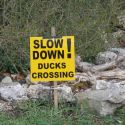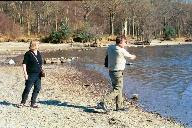Day starts with internet sputtering and then giving up entirely. And of course with internet as with electricity no easy way of telling how widespread the failure is. There is, of course telephone, but for anyone using a non-Turkish sim that’s an expensive option. No broken bones, still breathing? Well then no need to phone. Do eventually text Steuart despite normal respiration and intact body parts but he arrives at the door before reading the text bearing lemon jam he has made and with lovely suggestions for ignoring the internet outage, which it seems is everywhere, and exploring the west reaches of the island’s north coast. We’re not hard to persuade.
The west is much more sparsely settled and has a wild beauty along the narrow coastal road, with rocky peaks and sudden drops to a dark sea well below us. Wild flowers and olive and eucalyptus trees by the roadside and on the hills and no one in sight for miles, hardly a car on the road. In one of the coves the rocks mingle with the ruins of houses made of local stone and abandoned long ago. When and why unknown. The road takes us nearly to the western tip of the island before we double back on ourselves and head inland a
little to where the hills overlook fertile fields and the scene has become more pastoral. Still in the last hour or more we haven’t passed more than half a dozen cars. But now we can see in the distance the village of Koruçam, the little Maronite village that we visited a couple of weeks ago.
This time we stop for lunch, and lunch is an occasion worth devoting the afternoon to. It is midweek and midafternoon but Steuart and Maria are old friends and when Maria says she will bring us something good we take her at her word and don’t ask questions. Though S does caution us not to fill up on the salad, and he’s right of course. It’s followed by meze, including a small dish with kidneys and onion and homemade tahini, pickles, beetroot, and yoghurt.
We could, of course, stop at this point and think that along with the homemade wine and bread we’ve had a lovely meal. But the afternoon is sunny and slow and we have yet to reach the pièce de résistance. Unusually in Cyprus for a week day, there is lamb kleftiko, lamb slow roasted - traditionally in this country in an outdoor oven. The term kleftiko is Greek, meaning bandit or thief, coming from a time when a stolen sheep might well have been prudently buried to avoid detection when cooking, though hard not to imagine the aroma being a dead giveaway.
Actually the first language of this village is neither Greek nor Turkish, although both would be widely spoken, but a form of Aramaic as the Cypriot Maronites came from Syria and Lebanon a thousand years ago.
The Maronite Christian heritage shows in the decor - with the statue of Mary near the top of the chimney of the fireplace and the large evil eye protection charm lower down. The evil eye amulet is an equal opportunity protection, widely used in the Mediterranean by both Christians and Muslims, and in fact it predates both religions, its use going back to at least the sixth century b.c. It’s mentioned by Plato and Plutarch. Not regarded religiously as unfortunate superstition, either. There’s one above the apse in the Franciscan church in Larnaca. And here it is in the restaurant, ensconced among the photographs of everybody - the rich and famous, locals, families, the heart of the world. The reminder of what life should be about.








